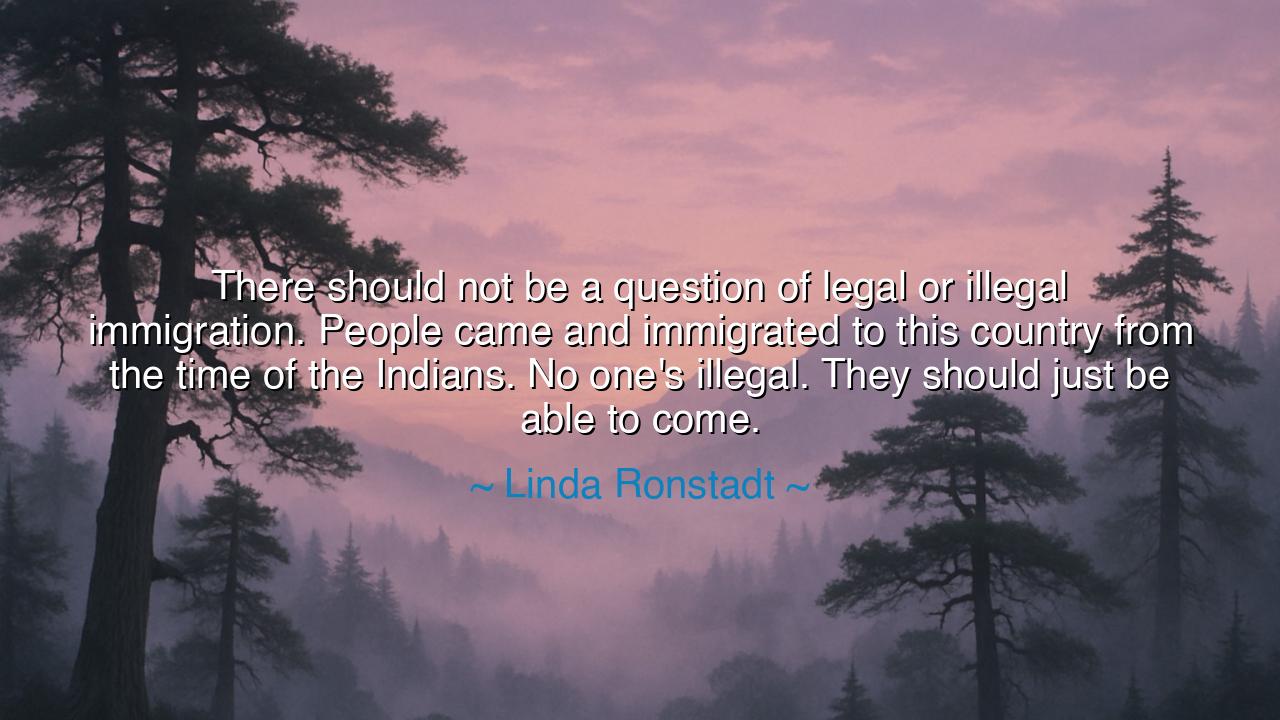
There should not be a question of legal or illegal immigration.
There should not be a question of legal or illegal immigration. People came and immigrated to this country from the time of the Indians. No one's illegal. They should just be able to come.






Hear the words of Linda Ronstadt, whose voice once lifted songs to the heavens, but who here sings not of melody, but of justice: “There should not be a question of legal or illegal immigration. People came and immigrated to this country from the time of the Indians. No one’s illegal. They should just be able to come.” These words cut through centuries of division, speaking to the deepest truth of human wandering—that we are all travelers upon this earth, seeking safety, shelter, and belonging.
The origin of this saying lies in Ronstadt’s own heritage and compassion. Born of Mexican roots and raised in the borderlands of Arizona, she saw firsthand how families were divided by lines drawn on maps, how cultures intermingled long before governments built walls or laws. In her eyes, to brand a person as “illegal” was to deny their humanity, to reduce a life to a label, and to forget that all nations are built upon the movement of peoples. Her voice is thus both personal and prophetic: a reminder that the borders of today are but recent inventions compared to the long migration of humanity across the ages.
Consider the history of America itself. Long before the arrival of European settlers, the Indians—the First Nations—moved across rivers, plains, and mountains, claiming no one as illegal, for the land was shared, shifting with the needs of the people. Later, waves of immigrants came—the Irish fleeing famine, the Germans seeking freedom, the Chinese building railroads, the Mexicans harvesting fields, the Africans, though forced in chains, shaping the very backbone of the nation. Each group was scorned in its time, each was told they did not belong. Yet without them, the nation would be empty of its richness. Ronstadt’s words remind us that “illegal” is not a truth of the soul, but a judgment of law—and laws can err when they deny the humanity of those they bind.
History also teaches us the cruelty of branding people as outsiders. Recall the Jews of Europe, told they had no place, no rights, no homeland—until the fires of persecution consumed them. Recall too the Japanese-Americans during the Second World War, citizens imprisoned simply for their ancestry. These stories echo the danger Ronstadt warns against: that to label a group as “illegal” is the first step toward stripping them of dignity, of safety, of life itself.
Yet her words are not only a rebuke, but a vision of possibility. She speaks of a world where borders are not barriers but meeting places, where migration is not feared but embraced as the natural rhythm of humanity. Her cry, “No one’s illegal,” is not lawless chaos, but moral clarity: that every person carries inherent worth, and that movement for survival or hope should not condemn them to scorn. It is a dream of a nation strong enough to welcome, not weak enough to fear.
The lesson, O listener, is clear: do not let the language of exclusion blind you to the humanity of your neighbor. A man, a woman, or a child is not “illegal”—they are human, and their story is sacred. The true wealth of a country is not its walls or armies, but the tapestry of people who build it, weave it, and renew it with every generation of newcomers. To deny this is to cut away the very fabric of the nation itself.
And what shall we do in our own lives? We can begin by speaking differently—refusing to call any soul “illegal.” We can extend welcome to strangers, support fair and humane policies, and remember that compassion is not weakness but strength. We can teach our children that their ancestors, too, once crossed borders, seeking the same hopes as those who come today.
So remember the wisdom of Linda Ronstadt: immigration is not a crime but a constant of the human story. No one is “illegal” for seeking a better life. Let us open our eyes, open our hearts, and open our arms, for in welcoming the traveler, we may find that we are welcoming ourselves. For all of us, in the end, are wanderers upon the same earth.






AAdministratorAdministrator
Welcome, honored guests. Please leave a comment, we will respond soon